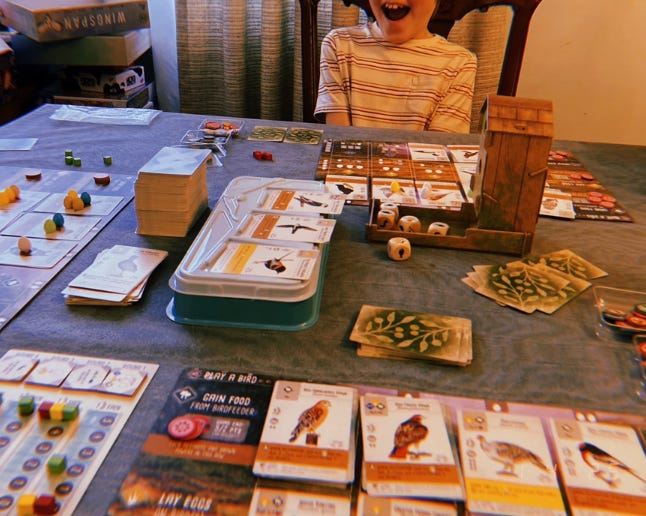A Standard For Humility
We are more like Bathsheba Everdene, Willoughby, and Mr. Wickham than we care to admit
““She was of the stuff of which great men's mothers are made. She was indispensable to high generation, feared at tea-parties, hated in shops, and loved at crises.”
Am I alone in my delight that the holidays are over? Don’t read into my question as if I am a scrooge, I purely reference the joy of getting back into routine. The days between Christmas and New Years are a blur, and afterward we were just waiting upon the first full week of getting back to normal.
School is upon is again after a two-week glorious break. Our favorite book we’ve been reading together is Understood Betsy by Dorothy Canfield Fisher is a 1916 children’s book about a young city girl who gets sent to live on a farm. Complete with a one-room schoolhouse and chores, neither which Betsy had heard of, she adjusts to living with her cousins in this lovely story. You can buy the book on Amazon for $8 or download it to your Kindle like we did (for free) through Project Gutenberg.
Recently, I made an americanized goulash (minus the onions and garlic), a recipe which I’m saving because it was delicious (photo credit: my 8-year-old protégé)
The same day, we played the game of Life and I lost horribly. Over the weekend, we taught our son to play Wingspan, a family favorite. While he did need reminders of what he could do on his turn, he was able to grasp the rules and came in 2nd place. I was, again, the loser. He was beyond elated, it’s halfway through the week and he’s still talking about it, even bringing it up to his speech and occupational therapists.
I have taken a hiatus from writing my novel, Fields of Iris. Life in the past few months has been too busy, even in the evenings, to find any time or energy to write. My husband joked that if I don’t start up again soon, he’s going to tie me down to the chair. It’s not that I can’t find any time to write, the challenge is that I struggle writing in short bursts. I need a long six-hour period uninterrupted (by myself or others). He’s right though, I need to stop making excuses and do it. A forced, made-up deadline will help. I’m nervous excited for you to read it.
Speaking of reading, I’ve completed another book for 2025 - Far from the Madding Crowd by Thomas Hardy. I rejoiced in its ending, quite literally, rejoiced that it ended. Not because I loathed the book, but because it’s taken me an entire year to read it. My sister can attest to it, with the added wonder of why I persisted. There are many books that I disliked or couldn’t get into, and never finished. Why did I stick with this one?
At the encouragement of Sarah Clarkson’s Book Girl, I had set aside several books to rotate through as I moved through 2024. Some, I finished the same day I picked it up as it sucked me into its world. Others, took me a little longer, and then there are many I have yet to finish. Far from the Madding Crowd was one that I persisted in finishing.
Hardy’s descriptions of the rural countryside were, at times, a major snoozefest. I tried to keep an open mind, but there were a few times where I felt myself bumbling through the words to get to the point. It was like asking your great-aunt where she got her elegant rug, and she proceeds to explain every single detail instead of answering the question. After reading other opinions, it seems I’m ‘odd-man-out’. It reminds me of Kristen Hannah, which heavy descriptions you have to be in the mood for. Despite that, Far from the Madding Crowd had a great plot and characters that made up for the drawn out descriptions.
If you’ve never read it, a quick non-spoiler explanation reveals the main character, Bathsheba, a woman who has taken up the responsibility of managing a large estate after her uncle died. While quite beautiful, smart, and resourceful, she is also quite impulsive and self-centered (specifically disregard for men’s feelings!), and her independence teetered to almost a fault of stubbornness and pride. Think Elizabeth Bennett meets Jane Eyre, meets Beatrice (Much Ado About Nothing) but with more moral shortcomings. Our dear, independently beautiful Bathsheba draws the attention of three different suitors: Gabriel, Boldwood, and Troy. Each of the men have opposing traits and vices: dutiful and traditional but jealous and irrational, loyal with integrity but overly idealistic and passive, charismatic and bold but selfish and exploitative. The three men and their opposing characteristics leave Bathsheba to face the consequences of her choices.
I also watched the 2015 film adaption, which was surprisingly good (though it left little screentime for one of the suitors) and as usual, the book is better. If you are looking for a romantic period-drama, add it to your list.

Hardy’s novel (and other famous female literary characters) did get me thinking about thinking about pride and self-control in our lives. My ladies Bible study is discussing pride tomorrow through Jerry Bridges book, Respectable Sins. He feels that pride fits into four categories - the unteachable know-it-all, the self-boasting (subtle or upfront attention seeker), the ‘better than thou’, and the ‘wiser than thou’. All of which are a hinderance to humility, and we serve a God who is in opposition to the proud.
If there was anyone on this Earth that had the right to be filled with pride, I would say Jesus. The Son of God. Owner of the right throne. Present at Creation. Knowledge that far exceeds our own. Quite literally wiser and perfect in every day. He came down humbly though, as a servant, who washed the dirt off of his disciples feet. God set the standard for humility, and it’s acted out through Jesus in the Gospels.
In Mere Christianity, C.S. Lewis wrote, “As long as you are proud you cannot know God. A proud man is always looking down on thing and people: and, of course, as long as you are looking down you cannot see something that is above you.”
Pride is like putting a bag over your head, ignoring everything else around you. How to guard against it? Make no mistake, He always offers us a way to guard against it. Draw near to the Lord in your life. Pray, dig into the Word, worship Him, and repent. Placing your heart, mind, and eyes onto Him helps adjust your thoughts and fleshly desires to match our King’s.
The same actions would have helped our dear Bathsheba with her struggle with self-control. I may have tamed my tongue, but certainly not my mind or other things in my life. The Bible says that the lack of self-control is a mark of a fool. Acting on your physical impulses. It’s a Christian discipline - to act out in righteousness, not by our flesh. Proverbs 25:28 says, “A man without self-control is like a city broken into and left without walls.”
Ephesians 4 comes immediately to mind: “I urge you to live a life worthy of the calling you have received. Be completely humble and gentle; be patient, bearing with one another in love….You were taught, with regard to your former way of life, to put off your old self, which is being corrupted by its deceitful desires; to be made new in the attitude of your minds; and to put on the new self, created to be like God in true righteousness and holiness. Therefore each of you must put off falsehood and speak truthfully to your neighbor, for we are all members of one body. “In your anger do not sin”- Do not let the sun go down while you are still angry, and do not give the devil a foothold. Anyone who has been stealing must steal no longer, but must work, doing something useful with their own hands, that they may have something to share with those in need. Do not let any unwholesome talk come out of your mouths, but only what is helpful for building others up according to their needs, that it may benefit those who listen. And do not grieve the Holy Spirit of God, with whom you were sealed for the day of redemption. Get rid of all bitterness, rage and anger, brawling and slander, along with every form of malice. Be kind and compassionate to one another, forgiving each other, just as in Christ God forgave you.”
It’s easy to read or watch these characters behave so miserably toward others, make poor mistakes that leave lasting effects, and judge so piously from our homes, yet we are truly more like them than we are like Christ. We want to be, and hope to be, and make attempts to be better, but I have more in common with Marianne’s Willoughby in Sense and Sensibility, or Edward’s sister, Fanny Dashwood. That pride seeps out again as soon as we flip the channel or page, oozing moral superiority over others, “how could she do that”, “what was he thinking”, “I’d never,”. No, I’d probably do worse and in the Lord’s eyes, we are both equal in our wretchedness.
Thank you Lord for your infinite, undeserving grace and mercy on us.








